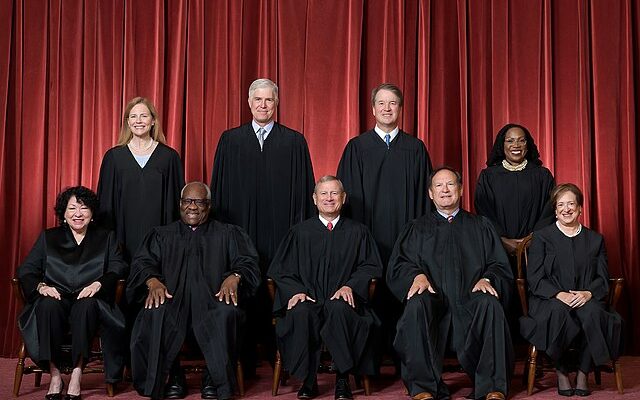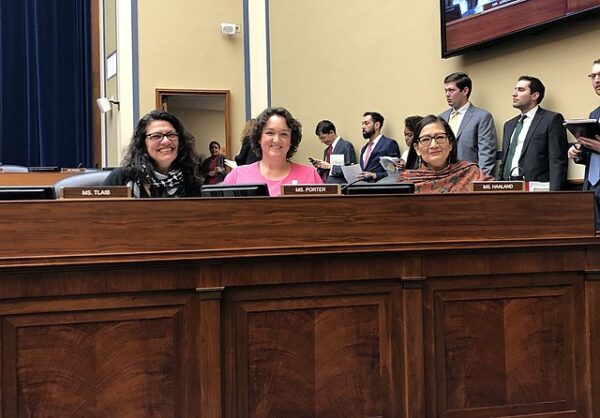
[Fred Schilling, Public domain, via Wikimedia Commons]
The Supreme Court on Tuesday upheld Tennessee’s law banning puberty blockers and cross-sex hormones for minors seeking to medically transition genders, ruling 6–3 that the statute does not violate the Equal Protection Clause. The decision, United States v. Skrmetti, marks the Court’s first direct judgment on state-level restrictions on gender transition procedures and affirms state lawmakers’ authority to regulate pediatric medicine.
Chief Justice John Roberts, writing for the majority, concluded that Tennessee’s Senate Bill 1 (SB1) “does not classify on the basis of transgender status” and is subject to rational-basis review, the most deferential standard. The law classifies based on age and medical purpose, not on a suspect classification. Roberts emphasized that “Questions regarding the law’s policy are thus appropriately left to the people, their elected representatives, and the democratic process.” He further noted that the Court’s role is not “to judge the wisdom, fairness, or logic” of SB1 but only to ensure it does not violate equal protection guarantees.
SB1 prohibits physicians from prescribing puberty blockers and hormones to allow a minor to “identify with” a gender identity inconsistent with their sex. The law permits these drugs for other conditions, such as precocious puberty, a distinction the majority defended as a legitimate exercise of state regulatory judgment.
The majority acknowledged “a recent report from England’s National Health Service on the use of puberty blockers and hormones to treat transgender minors,” underscoring the need for legislative flexibility in an evolving medical field. The Court did not assess whether Tennessee’s approach was optimal but confirmed its constitutional permissibility.
Justice Clarence Thomas filed a concurring opinion, joined by Justice Samuel Alito in part, expressing concerns about the medical and policy implications of gender-affirming care. Justice Alito also filed a separate opinion, warning that heightened scrutiny for laws involving transgender status could overstep judicial bounds.
At oral arguments for US v Skrmetti, a mom told @DailySignal her son knew he was a trans girl since “birth.”
“Violet told us when she was 1.5,” the mom said while protesting a Tennessee law banning child sex changes.
Today, the Supreme Court ruled states are allowed to protect… pic.twitter.com/NLFdSFGycy
— Elizabeth Troutman Mitchell (@TheElizMitchell) June 18, 2025
In dissent, Justice Sonia Sotomayor, joined fully by Justice Ketanji Brown Jackson and in part by Justice Elena Kagan, argued that SB1 discriminates on its face. She wrote, “By depriving adolescents of hormones and puberty blockers only when such treatment is ‘inconsistent with’ a minor’s sex, the law necessarily deprives minors identified as male at birth of the same treatment it tolerates for an adolescent identified as female at birth (and vice versa).” Sotomayor criticized the majority’s use of rational-basis review, calling it a “retreat from meaningful scrutiny of laws that harm vulnerable groups.”
Justice Jackson had previously said that states preventing children from having irreversible surgeries or hormone therapies was akin to banning interracial marriage.
BREAKING: Supreme Court upholds Tennessee’s ban on transgender hormone disruption for minors, 6-3, with only Kagan, Sotomayor, and Jackson dissenting.
Remember Ketanji compared this law to a ban on interracial marriage… pic.twitter.com/BsSpfWzoiM
— Breitbart News (@BreitbartNews) June 18, 2025
Justice Kagan, in a separate dissent, argued that “Tennessee’s SB1 warrants heightened judicial scrutiny” and that the case should have been remanded for further proceedings under intermediate scrutiny. She declined to resolve the case, stating, “I take no view on how SB1 would fare under heightened scrutiny.”
The ruling is likely to influence the legal landscape in over twenty states with similar restrictions. By declining to treat transgender identity as a suspect or quasi-suspect classification, the Court limited the application of heightened equal protection scrutiny in this area. Rational-basis review poses a significant challenge for plaintiffs seeking to contest such laws.
The Court left open the possibility of future constitutional claims under other theories, but Tuesday’s decision reinforces that state legislatures are the primary forum for debates over gender medicine. As Chief Justice Roberts wrote, the Court’s role is not to judge the wisdom of legislative decisions, only their constitutionality.











